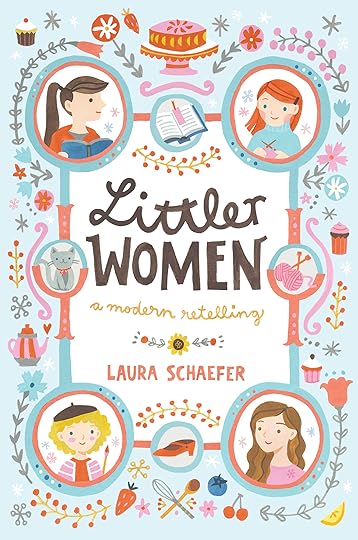Laura Schaefer's Blog, page 2
August 13, 2018
The Problem and the Solution
You know you have a book in you. You dream of creating a book that will persuade people--that will help them in concrete ways by communicating the mindset, techniques and specific approaches that have taken you so far in your field. You want to save people from the mistakes you made. A book can do this.A good book can also open doors in your own business--doors to new clients, to publicity and speaking opportunities. A book is a powerful thing to offer up to the world and to your community. The problem, however, is there's simply no time to organize your thoughts and set aside the hours it will take to bring the project to fruition.A book, even a short 100-pager, takes significant time and attention. It takes skill to complete and to polish. A book requires high-level experience that can cut through the fluff, get to the point, and make your ideas flow in a way that carries readers right along to the end. A book project, ideally, requires that you design chapters with a clear focus and helpful take-aways or action points. Imagine what this kind of book could do for your business. Just imagine. What is the first thing you would do if you had such a book? Would you print a thousand copies and send them to everyone you know? Would you sell your book at your next speaking engagement, or give it to all attendees to really wow them? Would you use your book to strengthen the impact of your next training or consultation? Would you give it to your children? Spend some time thinking about this. Actually creating the book is only one half of the equation. The power of the book comes in the form of your plan for it. It's a tool to differentiate yourself in a world where absolutely everyone has a website and a Facebook page. Not everyone has a book, and no one has the book you're capable of writing.But the problem remains: time.I'm here with a solution. Me. You know that straight-A student who always got her work done on time and even did the extra credit? That's me. I am here to do your homework for you. I like doing homework. Okay, not all homework. Please do not send me your accounting problems.But I really, really love books. Reading them, talking about them, organizing them, asking the questions that will make them better. I like people with big ideas and stories to share. So, if you have a book in you but you don't have the time to actually make it happen, you need to hire yourself a straight-A student from the Midwest who wants to help. Let's have some fun. Let's write your book! Drop me a line and we will figure out next steps, together. 

Published on August 13, 2018 10:56
July 16, 2018
Why Haven’t You Written Your Book?
You’ve been saying it for years: “I need to write a book.” But something is stopping you, and it’s probably the fear that it’ll just take too much time. Good news: I’m here to help!It’s true, writing a book takes some time—hours you’d rather spend with your family, time you need to devote to working or building your business. Nevertheless, if a project or goal is important to you, you’ll make time for it. And your book is important. That’s why the idea keeps tickling you brain, month after month, year after year. You have something important to say, and an incredible amount of value to give. You can’t hold it in any longer. Moreover, having a book will help you build your brand and establish relationships with the people you want to help. Writing a book is a supremely worthy endeavor.Fortunately, it doesn’t take NEARLY as much time as you think it will. You can have a whole book completed, albeit a short one, in as few as 15-20 hours and as little as one month. Don’t believe me? Well, here’s how this process would look in real life:1. Project kick-off (1 hour): You and I speak on the phone or meet in person. We talk about your book, your audience, your goals and your timeline. We bat around several chapter ideas. After that call, I put together a project proposal for you and work to create a preliminary table of contents.2. Voice memos: (30 minutes per day for 2-3 weeks for a total of 10 hours): You record your thoughts for me using your phone. This can be done over your morning coffee on the porch, during your commute, or even over your lunch hour. This is where you explain the main points you’d like to convey and tell me the stories that fully illustrate your ideas. Send the voice memos to me via email. Another option for this portion of the project is to simply write out everything for me in a rough draft or in simple bullet points. I’ll clean it up and organize.3. Initial draft review (2-3 hours): After I receive all of your voice memos or written materials, it’s my job to transcribe or make sense of them. I organize your ideas and write the book. I maintain your unique voice and do the necessary research to ensure everything flows. Trained as a writer for the web, I prefer to create short paragraphs and lots of subheads. Trust me, readers like subheads.Once I’ve written the first draft of your book, you’ll need to devote 2-3 hours to reviewing my work and answering the questions I have about the material. For example, perhaps you started telling a story and didn’t quite finish it. It’s my job to advocate for the reader to ensure every point makes sense and every story you’ve told has a clear resolution. Each sentence should fit into the larger thesis—main argument—of the book.4. Final draft review (1-2 hours): After integrating your feedback and answers, I complete the final draft of your book and copyedit the text. You’ll want to review this final draft, then take the time to either post your book to Amazon’s self-publishing platform (which is free and easy to do) or use it to grow your mailing list or provide value to your customers as a free gift.Now that I’ve allayed your fears about time, let’s talk about cost. It’s true that hiring an experienced ghostwriter for a full-length 50,000-word+ manuscript will cost between $25,000 and $100,000. However, that's not the full story. I find I enjoy working on shorter projects and ebooks in the 10,000 to 25,000-word count range (this equates to 35-70 pages). Because these projects are so much shorter and generally don’t require in-depth research, my rates begin at just $4,000. Let’s talk! You could have your book written in just one month. You’ll love the process and the result so much, we’ll be starting your second and third book before you know it.

Published on July 16, 2018 08:40
June 25, 2018
What I've Learned as an Executive Ghostwriter
I’ve been an executive ghostwriter for many years now, and I’ve learned so much in that time—not just about what makes a good book, but what makes the entire process of creating a book enjoyable.Read on for my key reflections, and reach out to me if you have a book idea!Don’t focus too much on length. Sure, we all have a few standard ideas about how long a book should be, but those ideas are in flux right now. One of my favorite business books is Seth Godin’s Poke the Box…and it’s only about 90 pages! Particularly in the era of ebooks, obsessing on whether you have at least 200 pages of material is completely unnecessary.Persuasion happens through storytelling. If you’re sitting down to finally write that book, you have a ton of valuable wisdom and insights to share with the world. But those insights and information won’t connect with your readers in a meaningful way unless it comes in the form of real-world examples and stories. As a ghostwriter, I’m always asking my clients for examples of what they’re telling me. I want details.Writing a book should be fun! Being a ghostwriter is a dream job for me, because I get the opportunity to spend time with interesting people. I want my clients to enjoy the process too, so I am easy to work with and enthusiastic. The entire process is driven by respect for one another’s time and my insatiable curiosity about what you have to share with the world. Let’s create something special together.Books can change the world. There’s almost nothing I love more than a good book. You know that feeling you get when an idea aligns with what you know to be true in your soul—but haven’t been able to express yet in words? That’s the gift we give your readers when we write a book together. We’re setting out the truths of the universe, of your industry, of your experience, one page at a time. Writing a book isn’t a trivial thing. It’s deeply meaningful to me. It’s my purpose.

Published on June 25, 2018 08:05
March 30, 2018
Ask Your Ghostwriter if She’s Ever Tended Bar
When you’re trying to figure out which ghostwriter to hire, you’ll probably look for someone with a lot of energy and enthusiasm for your subject. You’ll want to know whether she’s been writing for a long time. You need to know she’s a pro at interviewing and topic organization, and you should find out if she has a passion for books and genuine curiosity about your industry.But to make the experience particularly enjoyable, you should be vetting for personality as well. Here’s why.If you’re ready to tell your story and share your wisdom with the world, you need a project collaborator who is fun and easy to work with. Ideally, you won’t be able to wait for the interview sessions you’ve scheduled together because they’re so thought-provoking and therapeutic—cathartic, even. The very first person who needs to understand your story and see it from your point of view is your ghostwriter.That’s why you should hire a writer who was once a bartender. Bartenders are more than just skilled at making a great old fashioned. The best ones are also talented listeners. In a world too busy staring at its iPhone to make eye contact with you, a bartender is your friend and confidant. It’s a cliché, sure. But it’s also true.I began my first beer slinging job in 1999. I don’t remember much about it, other than getting sprayed with champagne during the New Year’s shift. Not long after that first unsatisfactory gig, I landed at a very special restaurant where I tended bar part time for over ten years as I grew my writing career. It was wonderful—like graduate school for studying life. I formed deep friendships, came out of my small-town shell, and met thousands of people I never would have otherwise.As I think about the relationship between bartending and writing, I see it as a highly symbiotic one. And I know I’m not alone—I doubt I’m the only professional ghostwriter out there who knows what’s in a Tom Collins. Now, many year later, I bring the skills and work ethic I learned in the service industry to bear on my ghostwriting projects. I love talking with my clients, and I think they enjoy talking with me. I believe the book writing process should be fun, reflective, and thought-provoking.Your ghostwriter should be curious, funny, and deeply empathetic…so ask her if she’s ever tended bar!

Published on March 30, 2018 10:29
February 21, 2018
Two Reasons to Write a Book You've Never Considered Before
Writing a book can greatly simplify your hiring process.You have to hire a new employee, but you’re feeling a bit anxious about it. Every single new hire is a giant leap of faith. It’s tough to tell if the person sitting across from you at the conference table is going to make your life easier, or be the source of countless headaches in the months or years to come. Picture this: the individual sitting across the table, hoping to join your company, says something that makes your ears perk up. “I saw your book on Amazon last week, so I downloaded it. I thought Chapter 4 was really interesting, but I’m confused. Don’t you think the central argument of that section contradicted the rest of your message? I mean, just a little?”Suddenly, instead of talking about where Candidate Four pictures herself in five years (UGH), the two of you are discussing ideas.You’ve found a way to determine if you’ve stumbled across a live one. By writing a book, you’ve reduced the risk of working with a stranger. Because after an hour of talking about the insights you’ve chosen to share with the world, you may have found a friend…or made an enemy.A book is a tool. A beautiful, useful tool for connection between humans. And not connection on the level of tweets—a connection born of something deeper, of the time it takes to actually write, and then read, a whole book.Writing a book is an act of giving.I’ve been a writer for a long time, which is to say I’ve been making mistakes as a writer for a long time. When I started in this career at age 21, I didn’t know what I didn’t know. My parents were not in creative fields; I didn’t have a published uncle or a managing editor for a cousin. Everyone I knew was encouraging and kind, but when it came to the brass tacks of earning a living as a freelance writer, I had to figure it out myself. So, I went to the library. And to writer’s conferences. I pieced together a career, very slowly, based a winning combination of one failure after another, punctuated with the odd success.The only reason I had any forward motion at all was thanks, in large part, to the wisdom I gleaned from others who were willing to share their foibles.Reflect on who you were at age 22. What would you tell that young man or young woman? By writing a book, you’re taking the time to shorten the learning curve for that person today. You’re paying it forward and accelerating human progress.You might think others have written your book and written it better, but I would argue the world needs more unique voices. It wasn’t until I discovered Jen Sincero’s hilarious take on the self-help genre in YOU ARE A BADASS that I realized I had a lot more control over my professional life than I had ever previously considered. I stopped wasting so much time and accomplished more in the year after I read it than I had in the previous three. Sincero says the exact same thing that hundreds (thousands?) of writers before her had said. But it wasn’t until SHE said it, in her irreverent, ironic, rockstar style that the message found its way through my incredibly thick skull. Your voice matters in ways you cannot possibly predict right now. Speak up.Writing a book, even with a completely awesome ghostwriter like myself, isn’t easy. It takes months. It takes deep reflection. It takes reading more email from me than you’d really prefer to. And if you do hire a pro to help you, it takes money. My rates start at $18k per project, and that doesn’t even include a book cover. (WHAT?)All that said, you should do it. Write your book. This year. This month. With me. So does writing them.
So does writing them.
 So does writing them.
So does writing them.
Published on February 21, 2018 12:31
January 29, 2018
Ask Your Ghostwriter Whose Writing Style She Admires
If you’re hiring a ghostwriter to help you write your book, a big part of her job is conveying your message in YOUR voice. The best books are often conversational, which simply means that when you’re reading them, it feels like the author is talking right to you. Reading someone’s book is the next best thing to sitting next to them at a party. So…if you hire a ghostwriter to write your book, it should be written in the style you prefer to best capture your unique voice and way of seeing the world.But what if you don’t really have a writing style yet?You’re not a writer! That’s why you’re hiring help! Fair enough. Your ghostwriter can help with this. Ask her which authors she admires, and you’ll get a good idea of how she might shape your message.Here are a few non-fiction writers I love, and why I love them:Seth Godin. Seth is a major thought leader in marketing and technology for a reason. He’s succinct, with wisdom that is both highly accessible and easily digestible. Known for his daily blog, Godin’s posts are often only a paragraph or two long (and sometimes even shorter). I loved his book POKE THE BOX; it was only about 80 pages. Brevity is the soul of wit—and, in my opinion, a great thing to encounter in a book.James Altucher. James leaves it all on the field. By that I mean he bares his soul and isn’t afraid to shock his readers to keep them reading. Altucher’s blog is highly personal and isn’t afraid to go to the dark places in life. He’s also very good at understanding how emotional and irrational human beings are, and speaking to our greatest hopes and fears. By being so open and unafraid of gatekeepers, James has attracted a huge audience. I like it.Jen Sincero and Samantha Irby. I’m grouping these two together because I love them for the same reason: they are absolutely hilarious. Jen and Sam keep you reading because they are so very, very funny. Both are unafraid of sharing their own personal foibles and absurd episodes, and it makes for books that absolutely sing.So, there you go: I admire succinct, honest, controversial, and hilarious writers. If that sounds pretty good to you, let’s work together! I have a room in my house that looks like this...only 400% messier and 800% more colorful. BOOKS ARE AWESOME.
I have a room in my house that looks like this...only 400% messier and 800% more colorful. BOOKS ARE AWESOME.
 I have a room in my house that looks like this...only 400% messier and 800% more colorful. BOOKS ARE AWESOME.
I have a room in my house that looks like this...only 400% messier and 800% more colorful. BOOKS ARE AWESOME.
Published on January 29, 2018 08:09
November 2, 2017
What to Expect When You Hire an Executive Ghostwriter
If you've never worked with a ghostwriter before, you likely have several questions about how the process works. How long does it take? Who owns the rights to the book once it's completed? Since I enjoy ghostwriting very much, I thought I'd take a few moments to set your mind at ease and explain what to expect when you hire me to complete your book project. Read on!1. Completing a 150-200 page book can take as little as 10 weeks. When a professional hires me to write their book, I work fast. I like to put five or six 90 minute in-person interview sessions on the calendar right away. I record our interviews with my iPad, and also take notes on my laptop as we talk. Within a day or two after each interview session, I generally add 10-15 pages of material to the working manuscript. Then, within the following week, I refine and polish that material. One reason I like to work quickly is I find the book has more energy and flow if I work on it directly after speaking with you every week. I want to capture the excitement you've conveyed to me about your ideas and experiences!2. I like to think of your manuscript as a living document. I use Google docs to work on your book (and I back up the file to Word for extra peace of mind). The reason is simple--it eliminates version control issues. At any point in the process, you can log in and see my progress on your book. You directly can respond to questions I've asked in margin comments. You can add detail to the manuscript itself. Working in Google docs together makes the whole process easy and collaborative.3. You own all the rights to your book. As your ghostwriter, I have entered into a work-for-hire agreement with you. If your book eventually becomes a bestseller and earns you millions of dollars in royalty payments, that is all yours.4. Working with a ghostwriter should be fun! If you think about writing with dread because you hated doing term papers in high school, don't worry. I love to laugh. Yes, I take the time to learn about your industry so I can ask intelligent questions. But I also like to see the lighter side and have fun while we're working together. This is your chance to reflect on what you want to say, to help others, to give advice, to communicate in an effective way, and to work with someone who really wants to understand you. The whole process should be enjoyable and satisfying.5. Will there be typos? Yes. While I pride myself on crafting very clean copy, the writer (even the ghostwriter) of any book should not also be the copy editor. You'll need to ask a second individual to give the manuscript a once-over before you decide to print the manuscript or publish it in ebook form. This person can be a freelance professional you hire, an employee, or even a friend. But it shouldn't be me.6. What happens to the manuscript when it's done? That's up to you. There are several easy to use self-publishing platforms online, and I'd be happy to give you a quick tutorial on how to use Amazon's, for example. But the decision about where and how to publish your book is up to you. You may want to hire a designer and print the book to sell or give away at events or conferences. You may want to publish it in ebook form on your website; or use it as a free gift for anyone who signs up for your email list. The possibilities are all exciting, but this part of the process is beyond the scope of the services I offer.Ready to work with a great ghostwriter? Get it touch with me via email: ljsch22@gmail.com, and we'll schedule a phone call to talk about your goals.
Published on November 02, 2017 07:24
October 10, 2017
6 Signs You Need a Ghostwriter
You keep thinking about things you’d like to tell others in your industry, but you never quite have the time to write that blog post, that article, or that speech. You’re even starting to forget what you’ve been wanting to say.You’ve grown so much in your career and you’re a game-changer in your field. You know it’s time to share some insights about your mindset, your approach, and your tactics. You worry that the valuable information in your head will be lost if you don’t finally make a push to get your book written.You have so much to say, but just can’t figure out how to organize it or where to start. Because the idea of actually working on your book is too overwhelming, you just keep putting it off.You find talking easy, but writing difficult. You feel your time is best spent working with and guiding your team or networking with new contacts, not holed up in your office trying to write. Your time is simply too valuable.You like the idea of sitting down for 5-10 pleasant interviews with an empathetic listener and experienced interviewer—and getting a whole book out of it. Instead of working on the project for 100 hours or more, you’d only have to put in 10-20 hours. Total.There are people on your team who could work on this project for you, but they’re too busy. You don’t want to add one more thing to all the full plates in your office. Also, you worry that someone who knows you too well won’t have the correct unbiased perspective.Ready to work with a great ghostwriter? Get in touch today!

Published on October 10, 2017 07:51
September 5, 2017
Are You a Little Women Superfan? Hey, Me Too!
We all have those blogs around the web we've been reading for years. In my case, that would be GoFugYourself, a celebrity fashion blog run by Jessica Morgan and Heather Cox. They've kept me coming back all these years thanks to their hilarious writing style and genuine, bookish zeal.Anyway, I mention these bloggers because they do a fun feature post every single Friday called Fugs & Pieces, and it's simply a link round-up of things they've read around the web that they think their readers would enjoy. It's always a great collection of pieces, and I check it every single week without fail.Today, I'm going to follow in the footsteps of my blogging heroes and do a link roundup for all the Little Women superfans like myself out there. It's the official book birthday of Littler Women: A Modern Retelling, and what better way to celebrate than by nerding out over all things Louisa May Alcott? There have been a lot of fun pieces about Little Women as we near its 150 anniversary, so let's have a look, shall we?Here goes:Texts from Little Women at The HairpinBeth Doesn't Always Die in Little Women at Book RiotGirls and Little Women at VultureLittle Women is Not Like Girls at Book RiotLittle Women on PBS at CulturessLittle Women on Masterpiece at PBS.orgGoogle Doodle Celebrates Trailblazing Author of Little Women at CNETParenting by the Books at The HairpinMillenials vs. Classic: Little Women at Player.fmLittle Women is Getting Another Movie at CinemablendLittle Women the entire textWhat did I miss? Send me a tweet or a message with your favorite piece about Little Women, and I'll add it to the list! Also, be sure to check out Littler Women: A Modern Retelling (for readers ages 8-12) at Indiebound, Powells, BN.com, or Amazon. Thank you!xo,Laura

Published on September 05, 2017 08:13
September 1, 2017
How to Support Your Child’s Writing Dreams
This post is for the parent of an adult child. I wish we had a better phrase for that. Fully-grown offspring? Anyway, you get the idea. You have a kid. She’s 18, or 22, or 25, or maybe 35. She says she wants to be a writer, and you want to support her because that is an awesome dream and you know she’s so, so creative and full of heart and just bursting with stories to tell the world. Or maybe she just doesn’t want to get a real job. Ahem. Hard to say.Here are some do’s and don’ts.Do support her and encourage her in your words and actions. Like her posts on social media, share her stuff, go to events, buy her book, all the obvious things you would do for a friend. Be her biggest and loudest fan.Do not pay her bills. Do not give her money (unless it’s a gift card on her birthday…thanks, Mom and Dad!). The thing about being a writer is it’s a huge, huge deal not to have to get up and go to work every morning. HUGE. AMAZING. UNUSUAL. What a significant, unique privilege it is to be a professional, self-employed writer. What hustle it takes, what perseverance! (Okay, I’m being self-congratulatory. Sorry. It’s a Friday and I’m punchy from a NyQuil hangover). If your grown child wants to write for a living, that doesn’t mean she gets a black check to mooch off of you until she’s 40 because it’s tough out there. (And it is so tough out there…the world does not want or need more writers. The world wants and needs more computer scientists and engineers and nurses. I’m not bitter at all about this, it’s just a fact.). She needs to bartend to pay bills until the writing pays the bills. Or be a nanny. Or a landscaper. Or drive an Uber. Wait tables. She needs to piece it together herself. Maybe it’s because I’m kind of done with it now (in one sense), but I believe in suffering. I think it makes you a better person and a real professional. The apartments I lived in should’ve been condemned. Yet here I am, seasoned! Wizened. Perhaps even a little bit asbestos-poisoned.Do listen with empathy to the struggle. Your budding writer will cry, probably several times a year for a good solid 15 years (I’m just guessing...erm) about how hard it is to do what she’s trying to do. She’ll rail against how unfair the world is, how publishing is changing, how the world has pivoted to video and she hates video, how she has no money for marketing, no time, no energy, the wrong computer, no Wi-Fi, no contacts, no MFA...you get the idea. You’ll want to swoop in and make it easier somehow. And you can, for real, swoop in…carefully. You can make her a delicious meal or send him a care package. You can listen. You can share all the times in your life when you were filled with self-doubt and fear and anger. Do this over and over and over until she grows into the person she has to be to live the life she wants to live. Don’t fix it, beyond just listening and offering a soft place to fall. You can’t. No one can. If she is determined to be a successful writer, she’ll figure it out.Do offer some ideas, but only if she asks. There are a lot of resources out there for the struggling creative. I’ve found a great deal of help in books offering professional tips and in self-help podcasts. (Shout out to Jen Sincero, you are the bee’s knees and I hope to meet you someday). I’ve personally benefited from switching to new kinds of writing, from improving my website, and from re-doing my LinkedIn profile. It can be helpful to brainstorm with your grown child when it comes to professional development, if that is what she wants. But wait until she asks. You can even say, “do you want me to help you come up with some ideas to get things moving?” For a long time, I thought that success as a writer would arrive like a thunderclap, like an obvious breakthrough. Nope. Instead, it's like building a road, one piece at a time. Piece after piece. Slow. Steady. Forward.Do not ask, “So, how’s the writing going?” No one can hear it in that question but me (I’m guessing), but to me it sounds pretty doubtful. As in, “So, how’s your plan to win the lottery going? Ready to give up and stop being an idiot yet?” See what I mean? Let her bring it up if she wants to discuss it. When you’re trying to do a hard thing, sometimes you just don’t want to talk about it because you’re in the trenches and it’s so, so dark and horrible down there and the smart thing to do, really, would be to give up. If you sense that the mood is light, however, you could say something like, “My job driving me bonkers lately. How about you?”Do let her quit. The biggest taboo in the world for budding creatives is quitting. And yet, and yet. Sometimes you just have to quit for awhile. About two years ago, I was really burned out on writing, just not feeling it at all. Discouraged, scared, etc. So I quit for a while. I took a very, very weird job selling adjustable mattresses in a boutique in a fancy suburb. I met Shaquille O'Neal, who was in fact too big of a person to fit in even a $10,000 bed. Then, after a lot of loooooong, lonely, tragic days (so alluringly tragic, so much rain and novel-reading and self-pity) spent sitting alone in a tiny mattress store not selling any $10,000 mattresses whatsoever, I returned to writing. And now I'm doing awesome! I got my groove back, in a much groovier groove than I ever had, pre-mattress store era. So there you go, the road never did run smoothly. Is what I'm saying.I thought La La Land was really a pretty silly movie, but then again, I’m going to quote it right now, so who knows what I even think anymore.Here’s to all the fools who dream.I love you. Enjoy your ramen and suffering, fools.

Published on September 01, 2017 10:49



